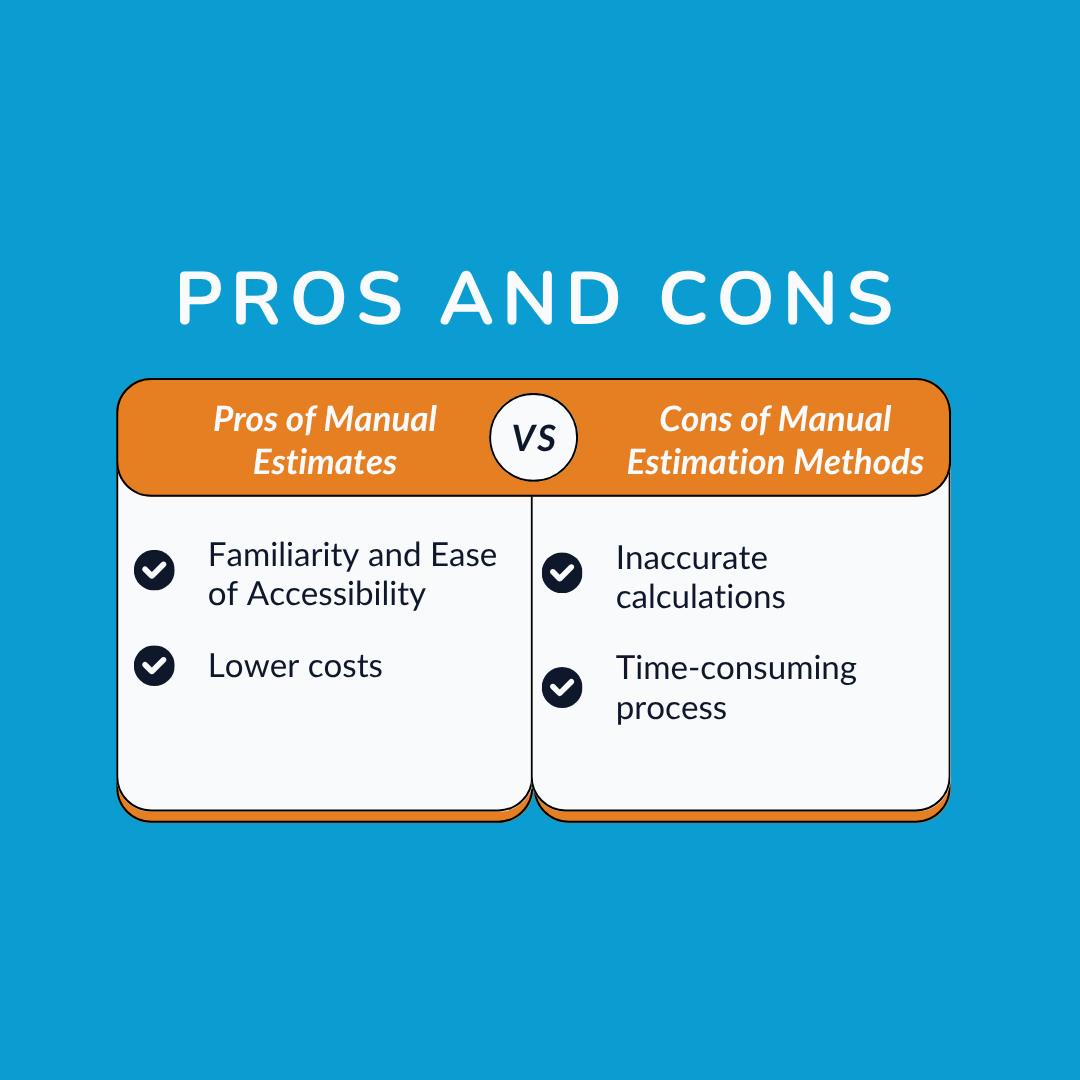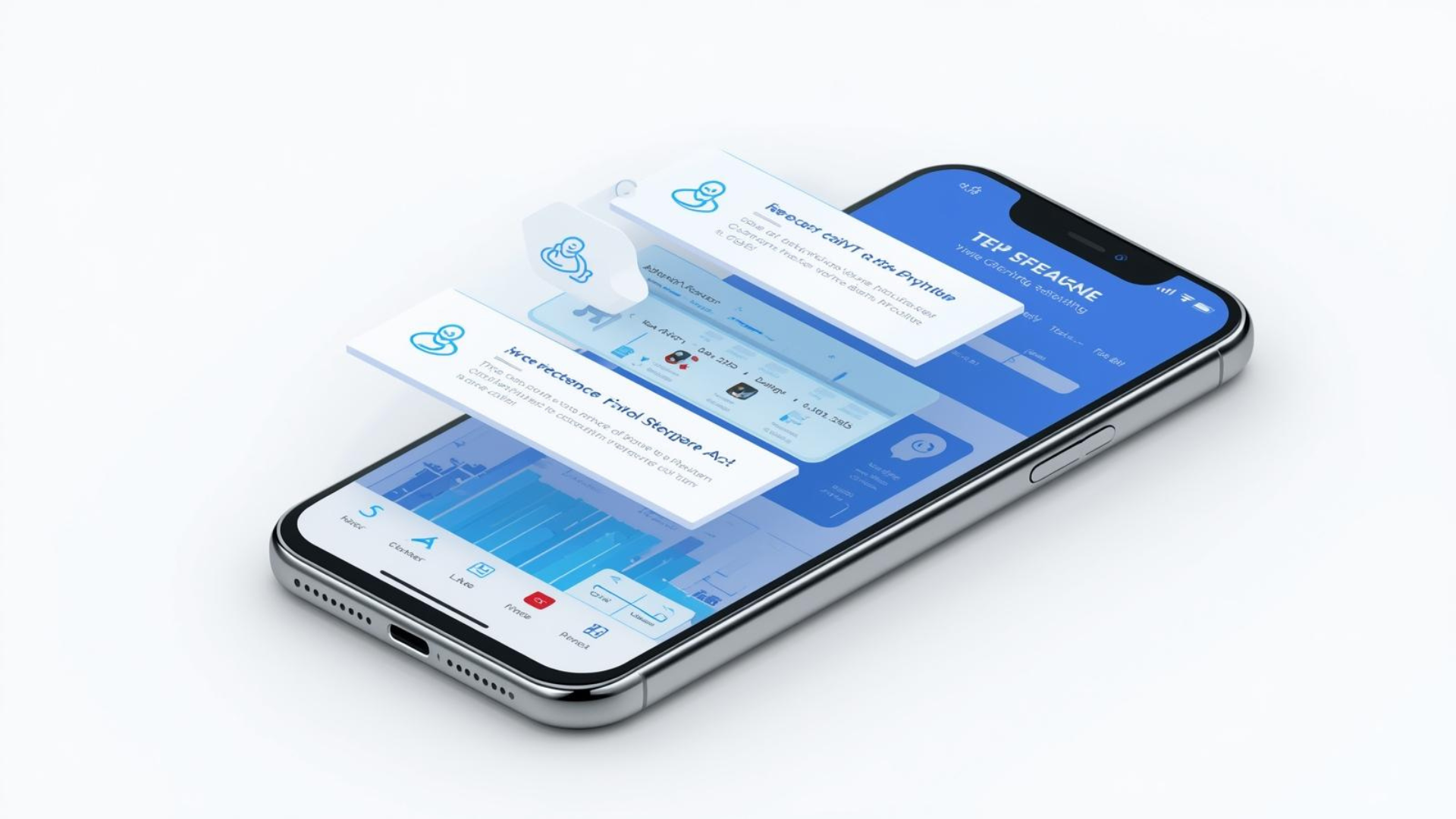HVAC Software vs Manual Estimation: Pros & Cons
A customer calls, requesting a quick quote for a comprehensive heating and ventilation system, including ductwork for their commercial property. You grab the paperwork, start calculating areas, labor, and materials. The client calls back: “This doesn’t sound right.”
So now, you’re stuck with reworking the math, losing time and confidence. Here’s where the real trouble starts: missed updates, hidden costs, time delays, and budget overruns.
It’s not just frustrating; it costs you jobs. What if there was a better way? HVAC estimating software brings speed, accuracy, and smarter bids. So, instead of doing all the work manually, you can simply use an effective HVAC software.
Let's weigh the pros and cons of using estimating software versus manual methods. This comparison will help you choose what best fits your business.
HVAC Software vs Manual Estimating: What’s Better?
HVAC estimating software replaces clunky document searches, exhausting calculations, and outdated manual workflows that drag timelines and increase costs, allowing for accurate takeoffs.
The software delivers automated, accurate estimates that help you send fast, professional quotes — making it easier to stand out and win more projects.
In this blog, we’ll explore how HVAC software brings automation, accuracy, and polished proposals to help you work smarter and grow faster.
Key Takeaways
- Manual estimates have been the norm in the HVAC industry, but they often cause costly delays and manual errors that impact business operations.
- HVAC estimating software delivers accurate and precise quotes along with instant, detailed, customized proposals that propel business growth by making operations more efficient.
- Both manual and digital HVAC estimating methods have their pros and cons.
- Digital software pros surpass the cons. They can be faster, more accurate, and streamline workflows, but require upfront investment and training.
Why Estimating Is Critical to Your HVAC Business Growth?

1. Profitability and Competitive Pricing
If you quote pricing to customers that is too high, you chase them away! Quoting them too low, you risk losses by eating your own costs.
In situations like these, striking a balance with smart and fair pricing is the solution. It can cover costs and keep you profitable.
Therefore, the right tool can make all the difference. HVAC estimating software with real-time pricing would automate quotes, utilizing real-time pricing to convert more leads into customers.
2. Customer Satisfaction and Loyalty
An HVAC business that delivers customized and professional estimates will build trust and commitment among consumers.
It is more than just winning jobs and earning your business customers' satisfaction that brings referrals and a boost to your brand reputation.
3. Efficient Project Management
Short on time, and your team is juggling multiple tasks? Managing estimates can quickly become chaotic.
However, using professional automated estimating and HVAC takeoff tools will help you generate accurate quotes faster, so your team can focus on more bids and get projects moving smoothly.
4. Business Growth and Expansion
As Dwayne Johnson states, “Success isn't always about greatness. It's about consistency. Consistent hard work leads to success. Greatness will come.”
HVAC estimating software brings this consistency to attach the strings of success to your business. Smarter, faster, and accurate quotes are the key to expanding business growth.
Check Out: 5 Proven Ways HVAC Business Owners Can Maximize ROI with Software
Is It Time to Rethink How You Estimate HVAC Jobs?
The United States HVAC market is forecasted to reach a valuation of USD 38.5 billion by 2030 at a CAGR of 7.87%.
These statistics indicate that trends are shifting rapidly, and you need to adapt to stay aligned with the fast-growing HVAC market. It is time to redirect your approach, and here is why!
- Stricter sustainability regulations are reshaping HVAC takeoff requirements and material choices.
- Material and equipment pricing is soaring high due to inflation and supply chain issues.
- Skilled labor shortage drives up hiring costs, increasing operational costs.
Moreover, residential demands for sustainability standards are rising, but competition is also getting tougher.
What Is HVAC Estimating Software?
HVAC estimating software is a digital tool that helps contractors quickly create accurate and precise cost estimates for HVAC projects, including duct installation.
It automates calculations for various components like compliance costs, materials, labor charges, and equipment to generate professional proposals that produce competitive quotes.
What is the estimating software, and why do you need it?
HVAC Estimating software is the smartest digital tool built for contractors that perform quick, accurate calculations for fittings to devise the total project cost.
Are you a builder, project manager, or subordinate? If yes, then HVAC estimating software is the solution to be faster and smarter at your bids.
Let's zoom in to explore what makes the HVAC estimating tool the ultimate go-to tool for contractors that win more jobs.
- Save time with ready-made professional proposals built within minutes for faster turnaround.
- Reduce errors with automated calculations that devise bids that are competitive and profitable.
- Digital takeoff mark for the measurement of materials to calculate total project costs.
- Mobile-friendly app to close deals faster with e-signature approvals.
Did you know: E-signatures can reduce document processing time from 3 days to just 2 hours.
Who’s it for?
- Small-to-mid HVAC businesses: Fits the functions and budget of scaling HVAC businesses.
- Senior estimators: Designed to create precise and in-depth details for every project estimate.
- Office Staff: Ideal for project managers and contractors looking to streamline their workflow.
Dilemma: HVAC or Manual Estimator
The Traditional Way: How Manual HVAC Estimation Works
A. The Process
1. Site visits
Contractors roll up their sleeves to physically measure and inspect the project location.
2. Note Taking
Inspection always involved a pen and paper scramble, jotting crucial details on equipment specifications and site conditions.
3. Spreadsheet Inputs
The day ended with all manual notes and estimations input into the spreadsheets for calculations and cost estimates.
4. Endless Phone call chase
Estimators chased down suppliers and subcontractors to obtain quotes for setting their estimates.
B. Common Tools
The old-school ways carried too much weight for the everyday grind of estimations.
Estimators use pen and paper to jot down information, and stacks of printed price lists with calculators.
Empty coffee cups and worn-out contractors typing into the spreadsheets on their desks- to carry out the never-ending cycle of data entry.
It carried too much sweat and stress.
C. Why it Fails?
1. Manual Errors:
A wrong number and the entire estimate, and your profits are flown out of the window!
Manual errors in calculations of oval ductwork were inevitable and often resulted in losing the jobs!
2. Limited Time Challenge:
Traditional estimating methods were a time-consuming process, as you had to manually set up measurements of the pipes, mechanical units, and duct systems.
Due to this process, valuable time was lost that could have been invested in high-value client building activities.
3. Frequent Plan Changes:
HVAC installation plans can be dynamic, and plans change! A new change brings new drawings and requires redoing the takeoff, which is prone to costly errors and time loss.
Why do Many Still Prefer it?
1. Familiarity with the estimating method
- Traditional HVAC takeoff for estimation has been around for a long time.
- It is a tried and tested process that makes it easier to adopt by most contractors.
2. Low Upfront Costs
- The traditional HVAC estimating costing process adoption is very pocket-friendly.
- An attractive investment for all those small contractors who have a limited budget.
3. Flexibility
- Traditional HVAC estimations are universal fittings for all spaces.
- Adaptable to different projects without the need for a complex learning curve.
Side-by-Side Comparison: Manual Estimation vs HVAC Software
| Feature | Manual Estimation | HVAC Estimating Software |
|---|---|---|
| Accuracy | Depends on the estimating team's skills. | Quoting tools for auto-calculations reduce errors. |
| Time to Deliver Quote | Several hours or days. | Minutes to a few hours for time-saving. |
| Consistency | Varies by estimator. | Standardized formats for estimating accuracy. |
| Cost Tracking | Manual input | Real-time cost databases |
| Client Experience | Basic document/email | Polished digital proposals |
| Scalability | Limited by labor | Grows with business |
Pros of the Manual Estimation Method

1. Familiarity and Ease of Accessibility
Most contractors are comfortable using old-school methods like pen and paper, manual calculations, and spreadsheet inputs. They don’t need to install specialized software or undergo training to use automated estimating tools.
2. Lower costs
It requires no software investment or subscriptions, making it the most cost-effective option for small business owners.
Cons of Manual Estimation Methods
1. Inaccurate calculations
Manual estimates can be prone to human errors that affect the final HVAC equipment sizing and cost overrun.
2. Time-consuming process
Manual preparation is a long process that needs data entry, endless calls to suppliers for price lists, and repeated calculation checks. It slows down the bidding process and slows the project completion turnaround time.
3. An Incomplete Analysis overlooks critical factors
Humans can miss critical factors such as insulation levels, regulatory charges, permit fees, occupancy patterns, and others. Ignoring them can result in less efficient HVAC systems.
Digital HVAC software- Accurate Estimates To Win More Jobs
Why is it a necessity in 2025?

1. Accuracy in Cost Calculations
- A smart estimating tool that accesses real-time pricing on labor, materials, HVAC equipment, and other resources to align with regional cost fluctuations accurately. This helps contractors stay competitive and market-aware.
- Accurate estimates reduce the risk of underbidding, which can lead to financial losses, or overcharging, driving away potential customers.
2. Professional Proposals
- Digital plans in the software enable contractors to create polished and professional proposals that showcase precision and expertise.
- Transparent visibility of every cost breakdown, ranging from labor to material charges and the project timeline charts, is the key to building customer trust.
3. Integration with Other Tools
- Digital HVAC software easily integrates with other tools such as CRM, accounting, and others to sync data automatically into one unified platform.
- Integrations enable workflows to be streamlined to boost efficiency and eliminate manual data entry across multiple systems.
4. Automated Lead Generation
- Captures leads from multiple sources that automate lead generation through the visual pipeline and assigns follow-up tasks.
- Contractors can reach a wider audience and convert potential customers into contractual clients.
Check Out: A Complete Guide to HVAC Project Management Software for 2025
What are the challenges?
1. High Initial Upfront Costs
- HVAC software can cost you dollars on hardware, software, and system configuration.
- The cost can turn away contractors, but its long-term saving justifies your expenses.
2. Training the Team to be Tech-Ready
- HVAC team members vary in technical skill and expertise, making training essential to adopt the new software functionality and its interface to perform daily operations.
- Training employees adds to the time delay for digital plans adoption, leading contractors to miss the ROI gains from the investment.
3. Adaptation to the New Workflow
- Transitioning to digital plans for HVAC requires a shift to new workflows and letting go of existing ones.
- Team members need to adjust to these changes, which can sometimes lead to resistance.
Best HVAC Software Solutions for 2025
1. HVACBase
About: A powerful cloud-based platform that manages leads, automates job scheduling, processes payments, triggers real-time notifications, and delivers detailed analytical dashboards to streamline your entire HVAC workflow.
Suitable for: HVAC contractors, operational managers, and field technicians looking to automate their workflow.
Core features:
1. CRM and Customer Management
Manage every customer interaction, track history, and store key information in one place. This ensures faster response times, better client relationships, and higher customer satisfaction.
Assign the right technician to the right job with minimal travel and maximum efficiency. The system reduces downtime, eliminates scheduling conflicts, and ensures technicians stay productive.
3. Accurate Estimating and Quoting Tools
Generate branded, professional estimates in minutes. Contractors can present polished proposals that win more jobs and close deals faster.
4. Invoicing, Billing & Payments
Create invoices instantly, track payments, and accept multiple payment methods. This speeds up cash flow and simplifies financial management.
5. Inventory Control and Reporting Dashboard
Track parts, materials, and tools across warehouses and trucks. This reduces stockouts, prevents over-purchasing, and ensures jobs are never delayed due to missing items.
2. Jobber
About: A simple field service management software that automates scheduling, invoice processing, and provides an instant communication platform.
Suitable for: Small HVAC contractors and business owners who need a simple interface to run the business.
Core features:
1. Professional Quote Builder
Create customer-friendly quotes in minutes, complete with markups, optional line items, automated follow-ups, and consumer financing options.
2. Calendar sync for job scheduling
Easily reschedule and reassign field jobs using a visual drag-and-drop calendar, with instant push notifications to your team.
3. Online Booking
Let new and existing clients book jobs directly from your website, social media, or custom booking link.
4. Client Hub
Give clients 24/7 access to view quotes, approve work, pay invoices, and request additional services through a personalized online hub.
3. Housecall Pro
About: A comprehensive SaaS platform suitable for home service professionals to streamline operations and enhance consumer experiences.
Suitable for: Small to mid-sized businesses looking to simplify the scheduling and invoice processing in their business operations.
Core Features:
1. Automated Scheduling
Automated scheduling and real-time job dispatch make it easy to schedule with technician notifications and job updates.
2 Invoicing
Customized estimates and fast invoice processing with digital e-signatures and online payment portals. Generate one-click digital invoices, send automatic
reminders, and sync seamlessly with QuickBooks for streamlined billing.
3. Instant customer communication
Manage all customer details, job history, notes, and documents in one place. Send real-time texts, emails, and “on my way” alerts directly from the platform.
4. Voice (VoIP & Call Tracking)
Take and make calls directly within the app, track lead sources, and simplify intake via VoIP.
5. Pipeline (Workflow Management)
Track leads, estimates, and job stages using a visual pipeline that helps convert more leads into jobs.
4. BuildOps
About:
It is an all-in-one management software built to streamline scheduling, dispatching, quoting, project tracking, and team collaboration.
Suitable for: Commercial contractors looking for centralized operations.
Core Features:
1. Smart Scheduling & Dispatching
Plan, assign, and tailor technician assignments with drag-and-drop scheduling and real-time status updates for smarter dispatching.
2. Instant digital proposal and invoice processing
Seamlessly connect all stages—from quote generation to job completion and invoicing—so everyone stays aligned from office to field.
3. Real Time Reporting & Analytics
Gain instant visibility into technician performance, trends, and KPIs with robust dashboards and reporting tools.
4. AI-driven insights for accurate quoting
BuildOps utilizes machine learning to analyze historical job data, material costs, and labor trends, enabling service teams to generate precise and competitive quotes.
5. Field Tech Mobile App
Equip your technicians in the field with a mobile app for completing work orders, accessing plans & manuals, and collecting signatures on-site.
5. ServiceTitan
About: It is a cloud-based field service management platform designed for residential and commercial contractors, offering an integrated system for quoting, scheduling, accounting, and CRM.
Suitable for: Mid to large HVAC companies, residential and commercial contractors looking to streamline operations and scale higher.
Core Features:
1. Scheduling
Book and assign jobs quickly with automated scheduling. Avoid double bookings and save time for your team.
2. Dispatch
Track technician availability and locations in real time. You can also optimize routing to cut travel time and costs.
3. Inventory Management
Manage parts, equipment, and stock directly from your mobile device. Prevent delays with accurate real-time inventory tracking.
4. Job Costing
Compare estimated vs. actual project costs. Protect profit margins with real-time expense tracking.
Heating and Cooling Made Easy: Unlock Efficiency with HVACBase
Switch to HVAC estimating software to stay ahead of the times- A smarter move that helps you win!
- Stay compliant with evolving regulations and sustainability standards.
- Get accurate material and labor costs using real-time pricing to protect profit margins.
- Speed up the estimating process to win more jobs smarter and faster.
- Stand out from competitors with polished and professional estimate proposals that impress.
Conclusion
HVAC estimating is a daily grind, but manual mistakes only add to the chaos, causing costly reworks and delays from inaccurate quotes and estimates.
These errors not only cost you more dollars but also often add losses to your balance sheet!
So why cling to old-school methods when your competitors are stealing the spotlight with HVAC estimating software that helps them make big leaps in the industry?
About HVACBase: Estimating Software That Transforms Workflow
Ready to transform your HVAC estimation workflow? Smart features can supercharge your operations to scale faster and boost efficiency. Discover the full range of powerful features as the ultimate game-changer!
See it in action- Schedule a demo today!
Have questions or need personalized advice?
Talk to an Expert Today and let our construction specialists guide you to success.






